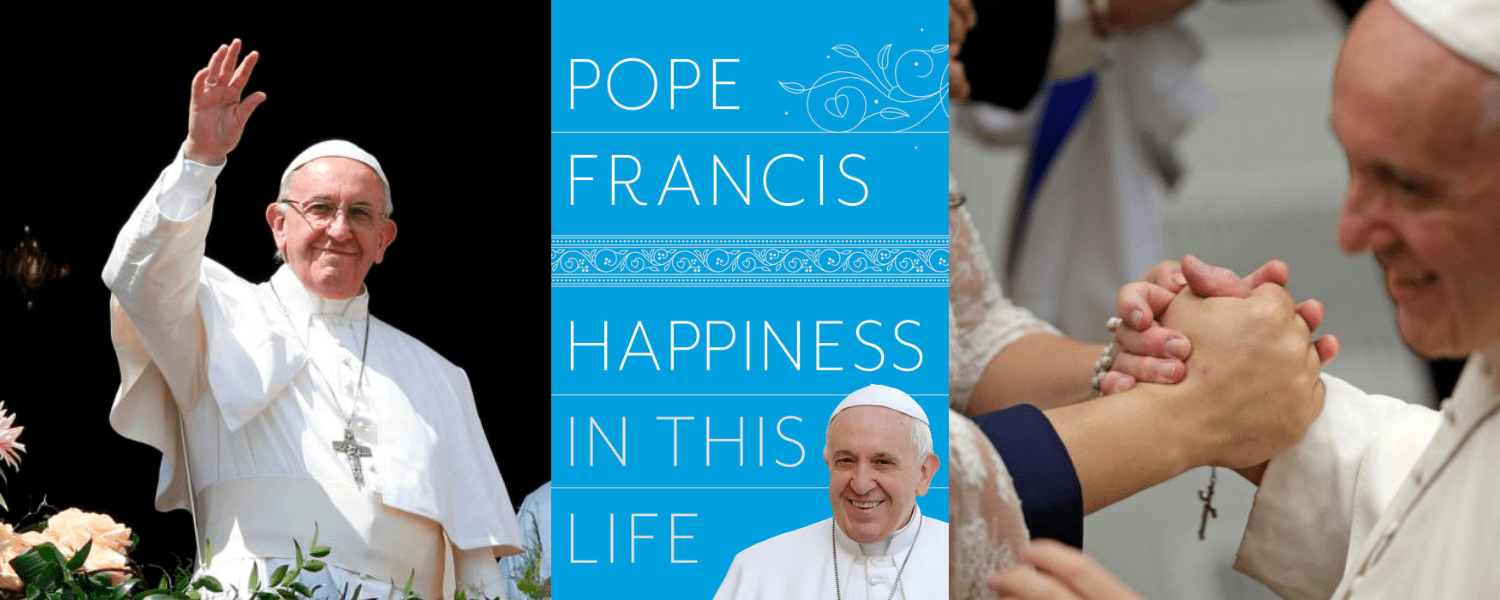Jesus once said to the apostles, “Whoever loves his life loses it, and whoever hates his life in this world will preserve it for eternal life.” (John 12:25) So when a book comes out titled Happiness in this Life: A Passionate Meditation on Earthly Existence with the pope’s smiling face adorning the cover, it is bound to raise eyebrows.
Has the Vicar of Christ on Earth gone back on the words of Christ Himself? Are we allowed now not to hate our lives in this world and still gain eternal life? Can we go even further and be happy in this life?
*****
Thankfully, perhaps, this book is not a theological treatise on happiness, nor is it Scriptural commentary. Happiness in this Life isn’t even a single piece of work. Rather, it is a collection of brief snippets, none more than 2 small pages long, culled from Pope Francis’s homilies, writings, and speeches since the time of his election in 2013. These snippets are organized around a few central themes, although at times, discerning the common thread in successive excerpts is challenging.
For this reason, I can’t recommend reading straight through the book. Instead, this book is tailored for savoring a few passages at a time. It makes a good reference work for someone who might be struggling and needing an encouraging word. Even better, it could provide material for daily meditation, because it is packed with insight about the big questions in life which cannot be addressed purely intellectually.
*****
“There is one word that I want to say to you: joy!”
Early in the book, I started underlining every occurrence of the word “joy,” but soon I realized if I continued doing so, I wouldn’t be able to set the pencil down. That Pope Francis emphasizes joy will not be surprising to anyone even slightly familiar with him. The four parts of the collection each emphasize related, but distinct, aspects of the search for joy in our earthly life.
The first part treats the individual spiritual conditions for joy, with a special emphasis on the Beatitudes. Pope Francis offers insights on individual Beatitudes, explaining what purity of heart and meekness are, for example. These insights draw connections with our concrete lives in fresh and thought-provoking ways.
Considering our contemporary political climate, one may be fascinated to read, “The poor in spirit is the Christian… who is not obstinate and opinionated, but who listens with respect; and who willingly defers to the decisions of others. If there were more of the poor in spirit in our communities, there would be fewer divisions, disagreements, and controversies!”
Pope Francis encourages us to work hard to create a coherent life, one in which we identify a grand dream or long-term goal and then organize our daily activities around that goal. Speaking with the wisdom of experience, he laments, “It is sad to reach a certain age, to look over the journey we have made and find that it was made up of scraps, without unity, without form: everything temporary.” The pope lauds the spiritual freedom that enables the Christian to recognize and choose the good and realize that life project. This freedom comes to us from God’s grace working in our daily lives.
*****
The material in the second and third parts of the book addresses the theme of joy in various circumstances or states of life. Pope Francis frequently teaches that our joy is found in relationship, in going outside of ourselves and encountering Christ in the poor, suffering, and outcast.
While there is ample material to reflect upon about human relationships in general, the collection shines in the chapters dedicated to families, priests and religious, and women. Pope Francis movingly speaks about the importance of a strong family life, for the family is the “school where we learn the art of living together.” The excerpts on women praise their dignity and their role in the Church, and the pope petitions for work to be done on a theology of the woman. My critique is that the pope does better at raising questions than providing steps towards answering them.
Any work on happiness in life must contend with the issue of human suffering. The passages on suffering gathered in the book display Pope Francis’s characteristic down-to-earth rhetoric. He employs personal stories, such as his reaction to watching people consult fortune-tellers in a park in Buenos Aires. Later, he muses on whether those who cause suffering, such as weapons manufacturers, can live eternally with God.
Most importantly, he emphasizes the mercy of God, encouraging us always to seek His forgiveness, especially in confession. If we are struggling under the weight of our sin, we must let God take care of it. “You may be ashamed to tell your sins, but as our mothers and our grandmothers used to say, it is better to be red once than yellow a thousand times,” explains Pope Francis. “We blush once, but then our sins are forgiven and we go forward.”
A short fourth part on prayer brings the book to a close. It includes a selection of prayers the pope has drawn attention to during his pontificate. Psalm 103, which extols the compassion and mercy of God, receives special emphasis, as Pope Francis challenges us to read it slowly every day. “Bless the Lord, oh my soul…Merciful and gracious is the Lord, slow to anger, abounding in mercy.”
*****
Jesus explained to the apostles, “I have told you this so that my joy may be in you and your joy may be complete.” (John 15:11)
The message of Jesus is that we must lose our own lives in order to be filled with His life, which brings total joy, even in this life. As Pope Francis explains, “This joy is not a question of hope, or something that awaits us in Paradise, as if we are sad here on earth but we will be filled with joy in Paradise. No! This joy is real and tangible now, because Jesus Himself is our joy, and with Jesus joy finds its home.”
So has the pope contradicted Christ in this book? Of course not. Has the pope offered us guidance on how to find true joy in this earthly life? Well, is he Catholic?


